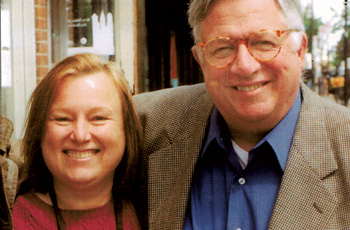This week’s Bloomberg Business Week magazine featured a phenomenal and very personal story of healthcare that actually captures many of the challenges around healthcare reform. The author, Amanda Bennett, takes us on a journey that she has titled, “Lessons of a $618,616 Death.” The true title, however, should have been, “How Do You Put A Price on 17 Months?” In this article, Ms. Bennett takes us on the step-by-step, blow-by-blow journey that ended with her husband’s death. She and a friend painfully reconstructed every page of his medical records, every dollar paid by her insurance companies, and every charge made by the various doctors and hospitals that treated him during the last years of his life.

Amanda Bennett and Terence Foley
She showed 1.) the grand total of charges, $618,616, 2.) the actual monies paid by the insurance companies to the hospitals after contractual negotiations, $254,176, and 3.) the total paid by her family, $9,468. In the article, she described the 30% overhead/administration costs, the costs of experimental drugs inside and outside of trials, and the 4,750 pages of medical records that were amassed during this time. For those of us who have “spent our time” trying to live within, cope with, and better understand America’s healthcare system, there were no surprises. For those of us who have watched a loved one take this cancer journey with all of its mysterious unknowns, there were also no surprises. Ms. Bennett’s quote, “The system has a strong bias toward action,” was, I believe, the most poignant in the entire piece.
A few weeks ago, I had lunch with a very healthcare-savvy individual who, when I jokingly referred to death panels, almost came across the table at me. She did not believe it was funny. To say that she was passionate would miss the point. Only the day before, I had spoken with another very intelligent healthcare reform advocate who indicated that the entire concept of death panels emanated from a payment code that reimbursed physicians for simply (or in some cases finally) talking to patients about their alternatives. I had heard other explanations, but neither mattered. What matters is that, in many instances, we are not discussing appropriate alternatives or revealing the quality-of-life issues often overlooked before beginning long courses of experimental drugs, or oncology drugs that may not have any positive impact on the health outcome of the individual.
Interestingly, Ms. Bennett did indicate that for all of the time, money, and pain invested in this journey, no one could confirm that her husband’s life was actually extended by these medical experiences.
Someone once described America’s healthcare system to me like this: You walk into Nordstrom, order several three-thousand-dollar suits, a dozen shirts and some handmade, silk Italian ties, then turn to the person beside you and say to the clerk, ‘”He is paying for this.” Our heroine Ms. Bennett did mention the fact that her husband would probably have questioned the use of all of these funds in this manner and the relationship that these expenditures might have had on all of the other people in the world who might have been helped by these dollars.
 When healthcare reform is discussed, it is personal. It is also deep, and it is costly, but the bottom line always comes back to this: “How do you put a price on 17 months?” In my book Taking the Hell out of Healthcare, I discuss the journey that my father and our neighbor took together over about a 17 month period. Both diagnosed with lung cancer, my father decided to go for it all. He had surgery, chemo, radiation, more radiation, and more chemo. My neighbor, a man without significant health insurance coverage, decided to spend his time with his family. They both died on the same day. My father died in a cold, tertiary care hospital where no clergy was present, his family members were not all able to be there with him, and it was over. In contrast, our neighbor died peacefully in his home, surrounded by his entire family.
When healthcare reform is discussed, it is personal. It is also deep, and it is costly, but the bottom line always comes back to this: “How do you put a price on 17 months?” In my book Taking the Hell out of Healthcare, I discuss the journey that my father and our neighbor took together over about a 17 month period. Both diagnosed with lung cancer, my father decided to go for it all. He had surgery, chemo, radiation, more radiation, and more chemo. My neighbor, a man without significant health insurance coverage, decided to spend his time with his family. They both died on the same day. My father died in a cold, tertiary care hospital where no clergy was present, his family members were not all able to be there with him, and it was over. In contrast, our neighbor died peacefully in his home, surrounded by his entire family.
Ms. Bennett did say that she was glad that she was not a bureaucrat having to deal with these issues. Frankly, I wish that she was!




